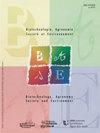The effect of oriented productive microcredit in Brazil: Incentive to default?
IF 0.6
4区 农林科学
Q3 AGRONOMY
Biotechnologie Agronomie Societe et Environnement
Pub Date : 2016-11-30
DOI:10.4013/BASE.2016.134.03
引用次数: 0
Abstract
This paper aims to analyze if the expansion of oriented productive microcredit (OPM) stimulated strategic default. This type of microcredit consists in a lending for low-income people to use exclusively in economic activity focused on promoting the generation of employment and income, and requires no collateral, defining, at least in theory, guidance and monitoring by the loan officers. Using aspects of asymmetric information, we aim to understand the potential incentives default generated by design-oriented productive microcredit contract. The lack of clear punishment in case of non-payment would tend to produce incentives for moral hazard. Thus, the hypothesis to be tested is whether the default is positively related to an increase in the amount of oriented productive microcredit. As a methodological approach, OLS models were used, where the volume of oriented productive microcredit would be the main explanatory variable of default, in addition to controls related to macroeconomic variables. The results show a positive relationship between default and the volume of oriented productive microcredit, suggesting that this type of debt contract induces problems of moral hazard, illustrates the economic consequences of contracts, and poorly designed laws. Keywords: Oriented Productive Microcredit, default, Moral Hazard, financial intermediation, credit access.巴西定向生产性小额信贷的影响:违约动机?
本文旨在分析定向生产性小额信贷(OPM)的扩张是否刺激了战略违约。这种类型的小额信贷是向低收入者提供贷款,专门用于以促进创造就业和收入为重点的经济活动,不需要抵押品,至少在理论上规定了贷款人员的指导和监督。利用信息不对称的观点,我们旨在理解以设计为导向的生产性小额信贷合同所产生的潜在激励违约。在不付款的情况下,缺乏明确的惩罚往往会产生道德风险的动机。因此,需要检验的假设是,违约是否与定向生产性小额信贷数量的增加呈正相关。作为一种方法方法,使用了OLS模型,其中定向生产性小额信贷的数量将是违约的主要解释变量,此外还有与宏观经济变量有关的控制。结果表明,违约与定向生产性小额信贷的数量之间存在正相关关系,这表明这种类型的债务合同会引发道德风险问题,说明了合同和设计不良的法律的经济后果。关键词:定向生产性小额信贷,违约,道德风险,金融中介,信贷渠道。
本文章由计算机程序翻译,如有差异,请以英文原文为准。
求助全文
约1分钟内获得全文
求助全文
来源期刊

Biotechnologie Agronomie Societe et Environnement
AGRONOMY-ENVIRONMENTAL SCIENCES
CiteScore
1.60
自引率
0.00%
发文量
12
审稿时长
6-12 weeks
期刊介绍:
BASE publishes original papers in the fields of life sciences: environmental science and technology, forest and natural space management, agronomical science, and chemistry and bio-industries.
 求助内容:
求助内容: 应助结果提醒方式:
应助结果提醒方式:


